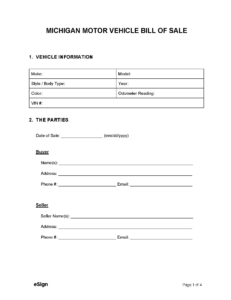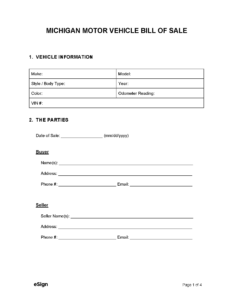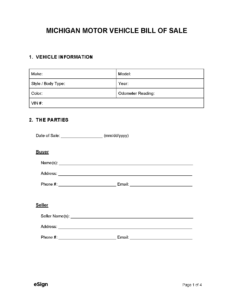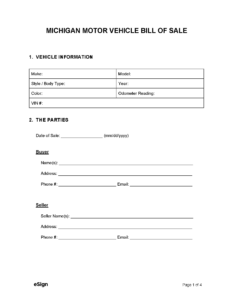Buying or selling a vehicle can be an exciting time, but it also involves a crucial piece of paperwork that often gets overlooked: the bill of sale. Think of it as your official receipt and legal proof of transfer, a document that protects both the buyer and the seller from potential headaches down the road. It ensures that everyone is on the same page regarding the transaction’s specifics, providing a clear record of ownership changing hands.
For residents in the Great Lakes State, understanding the ins and outs of this document is particularly important. While it might seem like a small detail in a large transaction, a properly completed bill of sale is fundamental for everything from registering the vehicle at the Secretary of State (SOS) office to establishing legal ownership and avoiding future disputes. It’s truly an indispensable tool for a smooth and legally sound vehicle transfer.
Why You Absolutely Need a Vehicle Bill of Sale in Michigan
When you’re dealing with a vehicle transaction, whether you’re the one handing over the keys or receiving them, a bill of sale acts as your legal safety net. For the seller, it proves that the vehicle is no longer their responsibility from a specific date and time, shielding them from liability for any incidents, parking tickets, or other issues that might occur after the sale. For the buyer, it’s irrefutable evidence that they are now the rightful owner, essential for obtaining a new title and registration in their name.
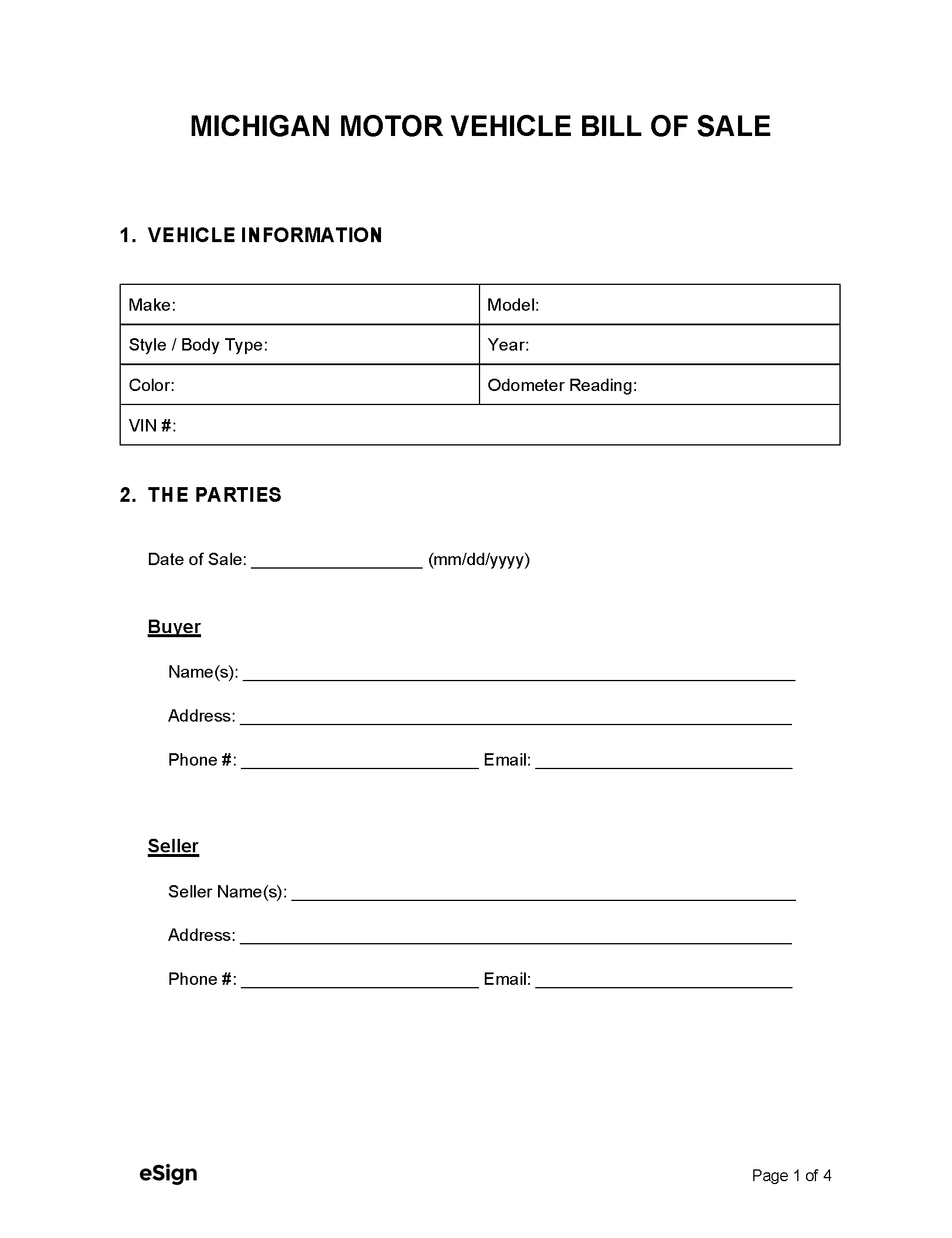
In Michigan, specifically, the Secretary of State office highly recommends having a bill of sale. While it isn’t always a strictly mandatory document for every single vehicle title transfer (especially if the title is properly assigned and notarized), it provides critical supporting information that simplifies the process. It helps establish the purchase price, which is vital for calculating sales tax, and confirms the date of the sale, which dictates when the new owner’s responsibilities begin.
Beyond the immediate requirements, this document is a powerful tool for dispute resolution. Imagine a scenario where the buyer claims they paid a different price, or the seller insists the vehicle was sold “as is” without written proof. A clear, signed bill of sale eliminates ambiguity, preventing misunderstandings and providing a concrete record if legal issues arise. It’s about peace of mind for both parties involved in a significant purchase.
Key Information to Include
To be effective, your vehicle bill of sale needs to be comprehensive. Here’s a rundown of the essential details that should be meticulously filled out:
- Buyer and Seller Information: Full legal names, current addresses, and contact details for both parties. This clearly identifies who is involved in the transaction.
- Vehicle Information: This includes the year, make, model, body style, and most importantly, the Vehicle Identification Number (VIN). The VIN is unique to your vehicle and helps verify its identity.
- Odometer Reading: The exact mileage on the vehicle at the time of sale. This is a crucial detail, especially in Michigan, as it’s often required for title transfers and helps protect against odometer fraud.
- Purchase Details: The agreed-upon sale price in dollars and the precise date of the transaction. Stating the price clearly prevents future disagreements about the financial aspect.
- Signatures of Buyer and Seller: Both parties must sign and date the document. This signifies their agreement to the terms and makes the document legally binding.
- “As Is” Clause (Optional but Recommended): If the vehicle is being sold without any warranties, including a clear “as is, where is” statement can protect the seller from future claims about the vehicle’s condition.
Ensuring every field is accurately completed leaves no room for doubt and strengthens the legal standing of the transaction. A missing piece of information can lead to complications later on, so double-check everything before signing.
Where to Find and How to Use a Vehicle Bill of Sale Template Michigan
Finding a suitable bill of sale template is easier than you might think, and thankfully, there are many resources available to help you. While generic templates can be found online, it’s always best to look for a specific vehicle bill of sale template Michigan residents commonly use or one that is designed with state-specific considerations in mind. You might find reliable templates on legal document websites, automotive resources, or even through a quick search for the Michigan Secretary of State’s recommended forms, though they don’t always provide a standalone bill of sale form, emphasizing its role as supplementary documentation.
Once you’ve secured a reputable template, the next step is filling it out meticulously. Start by entering the full legal names and addresses of both the buyer and the seller. Accuracy is key here, as this information ties the document to the correct individuals. Then, move on to the vehicle’s specifics: its make, model, year, and the all-important Vehicle Identification Number (VIN). The VIN must match the vehicle’s actual VIN precisely, usually found on the dashboard or driver’s side door jamb.
After detailing the parties and the vehicle, input the current odometer reading. This reading is vital for Michigan title transfers and helps ensure transparency about the vehicle’s actual mileage. Clearly state the exact purchase price and the date the sale took place. If there’s any trade-in involved, make sure that’s clearly documented too. Finally, and perhaps most crucially, ensure both the buyer and the seller sign and date the document. Having a witness sign can add an extra layer of verification, though it’s often not legally required.
Once the vehicle bill of sale template Michigan document is fully completed and signed, make multiple copies. Both the buyer and the seller should retain an original signed copy for their records. The buyer will typically need their copy, along with the properly assigned title, when they visit a Michigan Secretary of State office to transfer ownership, register the vehicle, and pay any applicable sales tax. This document acts as a clear, undeniable record of your transaction, making the post-sale administrative steps much smoother and more secure for everyone involved.
Completing a thorough and accurate bill of sale is more than just a formality; it’s a vital step in ensuring a legally sound and stress-free vehicle transaction. By taking the time to properly document all the details of your sale or purchase, you provide a clear record that protects all parties involved.
This attention to detail ensures that the transition of ownership is seamless, providing peace of mind and avoiding any potential misunderstandings or liabilities in the future. It’s a small effort that yields significant security for both the new owner and the previous one.
